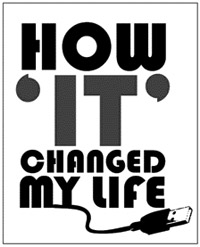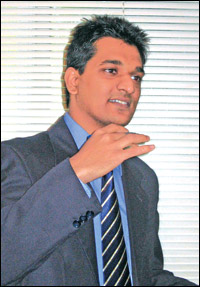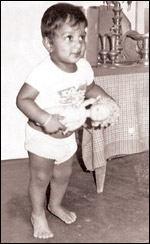 IT
value in a knowledge based economy IT
value in a knowledge based economy
It was technology and Social Media that helped to connect with this
talented young man living in Australia to understand how information
technology has changed his life. It was in fact an interview on Skype -
which I feel saves an amazing amount of time and resources when
communicating with a friend, your family or business clients abroad.
An old boy of Sudarshana Primary College Matara, the present Rahula
College Matara Primary section and Ananda College Colombo, Yasas can be
described as a high flier purely through application on technology
developments and hard work. Many say he is a real demonstration of ICT
being a truly global career.
Having worked in the USA, UK, Sri Lanka and Australia, being trained
in the USA and Malaysia and worked with truly global clients.
He explained his reasons in selecting IT as a career, "I was first
introduced to IT when I was 16 at a private institute, IDM, after my OLs.
My parents provided constant support for my education. I liked it and
realized that the future is actually a digital economy. I saw that jobs
are going to be abundant as the economy is heading that way.
And a few years later, today, what can we do without IT? I think I
saw this to some extent. Not that I saw it all, but I realized some of
it. So, when I did my A/Ls, I got marks that were good enough to go for
Computer Science".
He described about his background, "I played some cricket, even
though I wasn't a Sanath Jayasuriya". His father is a very senior pubic
administrator; he used to head the Sri Lankan Plantation Ministry, which
includes tea.
|
 | |
Yasas Vishuddhi Abeywickrama |
His first chance to explore the world was when his hard work was
rewarded by an international award from the Chartered Institute of
Management Accountants (CIMA) in London, by which time he was half way
through the university.
After graduation he joined Virtusa, a global IT services company
providing IT consulting, systems integration and application
outsourcing.
He had the opportunity to travel to the USA and UK as a Business
Analyst at Virtusa. He recalls his exposure at Virtusa, "I went onsite
to gather requirements and work closely with the clients. The UK stint
was with the British Telecom. In an offshore model, we basically talk
about a round-the-clock working model which is a result of the time
difference between the countries. This created a lot of challenges
starting from long hours, getting up at midnight for meetings to
communication obstacles such as explaining screen designs over
teleconferences which I really enjoyed".
He later travelled to South Australia, working for RevenueSA (State
Taxation Department) as a Business Analyst and then moving to Melbourne
because his wife had to change her university and was offered a position
by Accenture, a global leading consulting firm.
Currently he is into entrepreneurial activities and plays a keyrole
as the Director, Young IT Professionals Board responsible for policy and
strategy formation for young IT professional through the Australian
Computer Society. In this role he chairs a Board that has many young
active leaders from the industry, plus having the privilege of being a
Member of the ACS Congress, the highest advisory body of the coveted and
respected professional body, ACS. He explained, "The most touching
moment in my career thus, was when I was awarded the Young Professional
of the Year 2009 by Professions Australia for my achievements in the IT
industry as well as for the services that I have rendered to the
industry going well beyond the call of duty".
He along with his friends and family recently formed a foundation by
the name of Yasasa Lanka Foundation (www.yasasafoundation.org) through
which he hopes to promote IT education in Sri Lanka supporting the needy
for education among many other things.
|

Abeywickrama as a child |
I asked him about the impact IT has made on him, "It's changed me as
a person. I've never done anything else for a living. After studies, it
is my work that shaped me up. IT has seriously influenced me. The way I
think has been influenced, has impacted as a person and my career path.
IT is a global career and passport, which I experienced, IT gave me
the opportunity to travel to sevencountries. My analyzing skills have
improved drastically. IT is global. I had the opportunity to extend
myself as an international professional. I first got the opportunity to
go overseas because of my work in IT and then I got more projects and
jobs overseas. Also, it has made me realize how efficient businesses,
governments and people could be if they use IT. That's a fundamental
change in the way I see things now because my exposure to IT projects
that I had the privilege of working."
He went on, "The experiences and relationships I have built over the
past several years will be used to bring value to my motherland in a big
way in the very near future. While I've spent time overseas in the last
few years, my main focus is to serve Sri Lanka and its people. I always
respectfully remember that I studied in government schools and a
government university in Sri Lanka enjoying the full benefits of free
education in the country funded by our people. It is simply not right
for me to not do a service to this lovely country and I will endeavour
to do it to the best of my ability".
He described his childhood dream, "When I was 16 or so, I started to
like IT and my A/L results were good enough to land a spot at Computer
Science in the Colombo University. But growing up as a child, you know
it's the system that defines your destiny to some extent and not
entirely you. But I have to say I was lucky enough to achieve what I
wanted when I really started to understand things. But if you want me to
talk about my dreams from the very young days, my answer still would be
I don't know.
"He explained, "But I know one thing, I always liked to be different.
Be innovative. And to think outside the box". I probed deeper "Again,
systems mould people into standards, people expect everyone to do the
same thing, same way and achieve the same results. I questioned that
from very young and still do. I hope I can contribute to changing our
systems as well as the mentality. People need to be different, do
different things and that's how the human kind evolves." In an evolving
industry it is important for all to be in par with the global market.
Yasas shared ideas on how he pursue to be competitive in the arena,
"In the last couple of years, my close association with the Australian
Computer Society (ACS) has helped me with this. We promote continuous
lifelong learning and professional development and a part of my roles
have been to organize that.
While I get to learn I've also embraced the idea. On the other hand,
I have been a strong promoter of professional networking for young
people. My extensive network nourishes me with knowledge and experiences
and I want others to embrace the concept and benefit from it too. I have
spoken to an uncountable number of audiences around the importance of
professional networking and will continue to do the same. I will bring
this value to Sri Lanka as I know young Sri Lankans need an introduction
to professional networking and we need more opportunities for that too".
A knowledge economy is a must for the development of a country, he
shared "This is crucial. As a country, we do understand the importance
of education and knowledge. We don't have to do the hard work of
promoting the same.
We have got the best opportunity in our life time to get this country
back on track. We just came out of a war, people are positive,
businesses are booming and what's more, it's the time to promote a more
liberal knowledge economy. Our youth have to have access to knowledge
that they like and the knowledge that get them jobs, knowledge that adds
value to our economy and country.
Let's face it, are we strong in minerals and mines as Brazil is? Or
as South Africa is? Or can we compete in the manufacturing industry with
global giants? In my personal view, it is tourism, agriculture
(including tea) and the knowledge based service industry that could lift
us to the next level. We need to capitalize on this opportunity".
To this the contribution of the youth in the country is important.
Yasas encourages them to look to the future. Look where the world is
headed.
The BPO industry is something that would drive our economy in the
future if we create the right knowledge and skills in our youth. Yasas
encourages the youth to consider contributing to that as well as develop
an interest in it.
Web 2.0 and the internet have meant that every single one in our
society has easier ways of contributing to the knowledge. Promoting
their own ideas and opinions through such media and will make a
contribution. In addition to that, by our youth creating an interest in
the knowledge economy, what happens is that we prepare the human
resource needed for that economy to thrive. He discussed about the
challenges faced by the BPO industry, "The biggest opportunity and
threat for us in my opinion is India. It's an opportunity because when
we present ourselves to western companies as a BPO destination, they see
us as a smaller version of India, which is already successful as the
world's best BPO destination. Secondly, being geographically so close,
we can provide a great back up location for Indian BPOs. But there are
challenges as well. When a small company in Sri Lanka tries to provide
BPO services, many clients would be questioning the need to go to a new
destination when there is an already proven and similar location in
India.
I believe we need to show what's special in our offering? What can we
do better? We need to soon up skill our youth with knowledge that caters
to the BPO industry but could offer something different, special and
better than the other competing BPO destinations".
Our focus to improve IT and capacity should be based on making IT
part of everyone's school education to get the numbers required. However
the output numbers should be market driven, if IT is in demand, the
output should increase proportionately. In other words it shouldn't be
based on a pre-defined allocation in the higher education system.
We also need to ensure we train good teachers and improve the
vocational education sector for IT. All these would create more
opportunities to learn IT for vocational and higher studies. Capacity
building is priority to build a strong BPO presence. It is also
important to improve English and soft skills of our youth that are
studying IT. The use of IT effectively for government services is
crucial, which is a concerned area with ICTA and the governments IT task
force at present.
Providing access to IT infrastructure to citizens is another
priority. For instance, our internet penetration is low but growing.
According to the ITU 8.3 percent of the population in Sri Lanka use the
internet.
The government is currently working with ICTA in forming Nenasala's
across Sri Lanka ensuring the growth, additionally the mobile operators
in Sri Lanka can be used to implement and engage the majority with the
information available in the web sphere.
www.prwire.blog.com |



